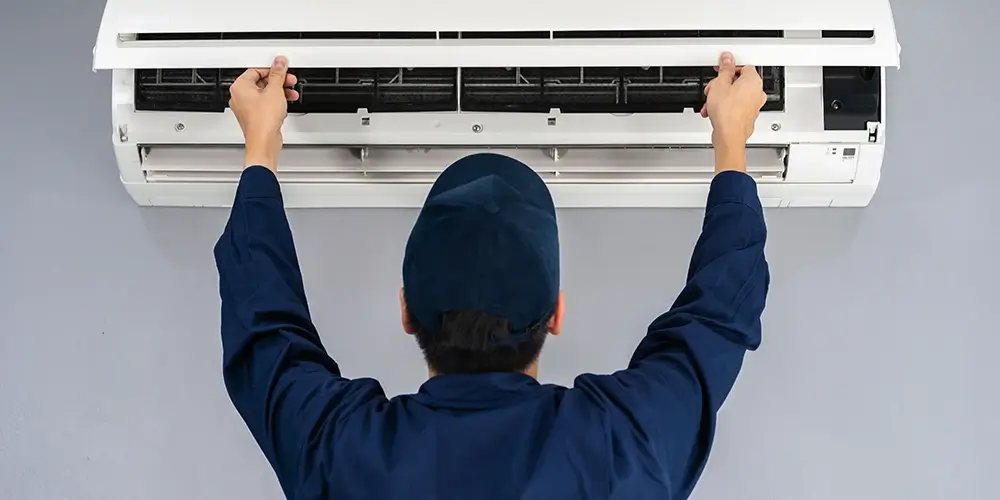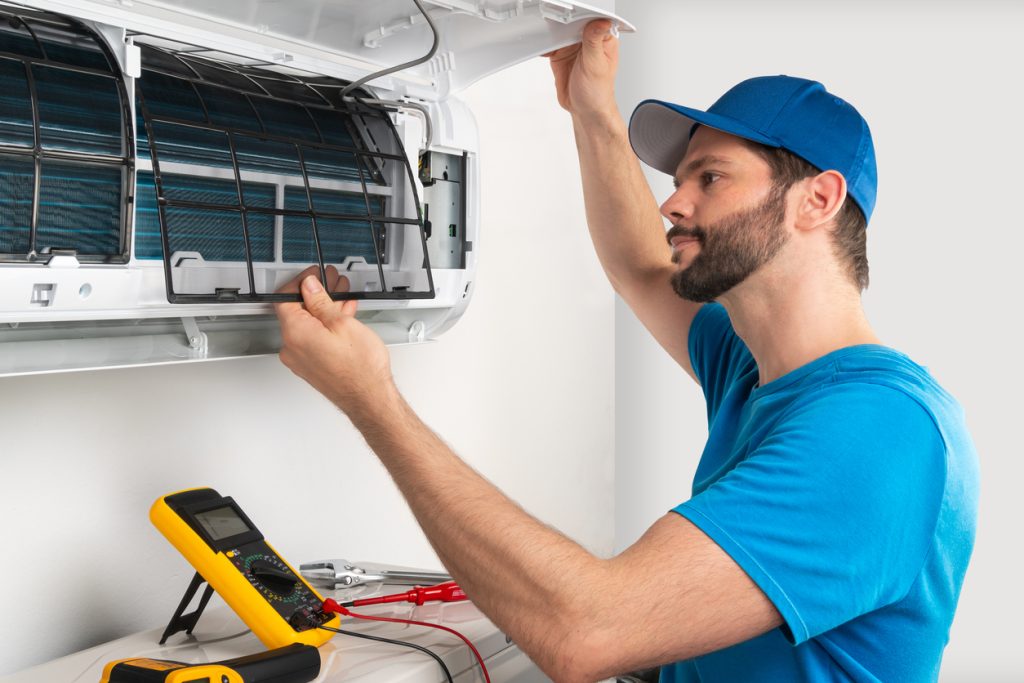The Ultimate Guide To Air Conditioner Repair Near Me
The Ultimate Guide To Air Conditioner Repair Near Me
Blog Article
The smart Trick of Ac Fixing That Nobody is Discussing
: Expert Cooling System Remediation Ensures Your Home Remains Comfortable All Year Round
Types of A/c Systems
When tackling air conditioner repair work, comprehending the type of a/c system you're dealing with can conserve time, money, and aggravation. Ever questioned why some systems cool a space quicker than others? Or why certain systems seem to break down more frequently? Let's peel back the layers.
Central Air
The Best Strategy To Use For Air Conditioning Repair Near Me
Picture a cool breeze streaming through a whole home, whispering comfort into every corner. Central air systems do precisely that. They utilize a network of ducts to distribute cooled air, relying on a compressor and condenser outside, paired with an evaporator coil inside. But when this complex beast fails, identifying the issue can be like finding a needle in a haystack.
Split Systems

Split systems are a popular choice for numerous homes-- part indoor unit, part outdoor compressor. They provide flexibility and performance, but their double nature means repair can include either part. Have you ever heard a strange noise outside your home only to find the indoor unit isn't cooling? That's a classic indication of a split system problem.
Fix Air Conditioner for Beginners
Window Units
These compact warriors fight summer heat by fitting comfortably into a window frame. They combine all parts into a single box. Their simplicity frequently implies fewer repair headaches, however disregarding filters or permitting debris buildup can cause reduced performance or breakdowns.
Ductless Mini-Splits
How Air Conditioner Repair Near Me can Save You Time, Stress, and Money.
Ductless systems bypass ductwork totally, making them ideal for homes without existing ventilation. They're peaceful, effective, and surprisingly resistant. When repair work are required, professionals should be adept at dealing with refrigerant lines and electrical connections-- no little feat.
Quick Referral Table
| Type | Key Features | Common Repair Work Issues |
|---|---|---|
| Central air conditioning | Ductwork, whole-house cooling | Duct leaks, compressor failure |
| Split System | Indoor & & outdoor systems | Refrigerant leaks, fan motor problems |
| Window System | All-in-one, simple installation | Unclean filters, electrical faults |
| Ductless Mini-Split | No ducts, zoned cooling | Line leakages, sensing unit breakdowns |
Get This Report on Ac Repair
Deciphering the Many Regular A/c Problems
Have you ever wondered why your air conditioning system unexpectedly stops cooling during a sweltering afternoon? One typical culprit is an unclean or blocked air filter. This tricky villain restricts airflow, forcing your system to work overtime, which not just minimizes efficiency however can also lead to early breakdowns. Think of trying to breathe through a headscarf soaked in dust-- it's tiring!
Another frequent misstep is refrigerant leakages. These invisible leaks do not just decrease cooling power but can likewise damage the compressor, the heart of your air conditioner system. How typically do you look for uncommon hissing noises or ice development on the coils? Capturing these signs early can conserve you from expensive repairs down the line.
Beyond the Essentials: Lesser-Known Issues
How Repair Air Conditioner Near Me can Save You Time, Stress, and Money.
Sometimes, the thermostat itself is the nuisance. Miscalibrated or defective thermostats send blended signals, triggering the air conditioning to cycle unpredictably. Ever skilled your air conditioner switching on and off in fast succession? That's called short cycling, a tricky performance drainer that can wear out parts faster than you 'd expect.
Electrical problems, such as used electrical wiring or a malfunctioning capacitor, might hide underneath the surface. Air Conditioner Repair Near Me. These often manifest as AC units failing to start or all of a sudden shutting down. A professional eye knows to test these elements with precision tools, something a casual glance won't reveal
Expert Tips for Diagnosing Common AC Problems
Excitement About Fix Air Conditioner
- Examine and change air filters routinely-- every 1 to 3 months depending on usage and environment.
- Listen for uncommon noises like rattling or buzzing that could signify loose parts or electrical faults.
- Inspect the outdoor unit for debris or blockages that restrain air flow and cause overheating.
- Look for frost buildup on evaporator coils, a hint towards refrigerant issues or air flow limitations.
- Evaluate the thermostat settings and recalibrate if the temperature readings feel off.
Quick Referral Table: Manifestation & & Probable Triggers

| Sign | Probable Cause | Specialist Idea |
|---|---|---|
| Warm air blowing | Low refrigerant or filthy coils | Clean coils and look for leakages immediately |
| Brief cycling | Thermostat issues or large unit | Change thermostat settings and consult sizing standards |
| System won't start | Electrical faults or capacitor failure | Test electrical wiring and replace capacitors as required |
| Water leak | Clogged drain line or frozen evaporator | Clear drain lines and check for coil icing |
DO IT YOURSELF A/c Maintenance Tips
Ac Air Conditioner Repair Can Be Fun For Everyone
Ever discovered your air conditioner sputtering like an old engine on a hot summer day? Disregarding subtle indications frequently means more than simply a sweaty afternoon-- it's a start to unanticipated air conditioner repair work costs. But what if you could capture those whispers before they develop into wails? Regular do it yourself maintenance can be your first line of defense.
Easy Steps to Keep Your AC Running Smoothly
The 9-Minute Rule for Air Conditioning Repair Near Me
- Tidy or Replace Filters: A blocked filter resembles attempting to breathe through a headscarf. Every 1-3 months, examine and swap out your filters. It enhances air flow and efficiency, preventing compressor stress.
- Check the Condenser Coils: Dust and debris function as unnoticeable blankets smothering your unit's cooling power. Carefully brush or vacuum the coils, but avoid extreme chemicals that may deteriorate the metal.
- Check the Drain Line: When was the last time you glanced at your drain pan? A blocked drain can trigger water leakages and foster mold growth. Flushing it with a vinegar service monthly keeps the circulation clear.
- Seal and Insulate: Are your ductworks whispering leakages? Sealing gaps with mastic or foil tape boosts effectiveness and cuts down on unequal cooling.
Pro Tips Beyond the Essentials
- Measure your unit's voltage to capture subtle electrical wear before it triggers big problems.
- Listen for uncommon hums or rattles-- these acoustic breadcrumbs often signal loose parts or failing motors.
- Keep outside systems shaded however guarantee a minimum of 2 feet of clearance around them for optimum air flow.
Ask yourself: Are you hearing your air conditioner's peaceful SOS or simply waiting on it to shriek? Requiring time for DO IT YOURSELF air conditioning maintenance changes reactive repair work into proactive care, saving sweat, tension, and yes, cash.
The smart Trick of Fix Air Conditioner That Nobody is Discussing
Why Competence in A/c Repair Matters
Picture this: your air conditioner system sputters and groans throughout a scorching afternoon, leaving you sweltering inside. Would you trust a novice fumbling with fragile elements, or would you seek the reassurance of a expert air conditioner specialist!.?.!? The complexities of modern air conditioning systems demand accuracy and experience. A slight mistake can escalate a small breakdown into check here an expensive disaster.
The Best Strategy To Use For Ac Repair Near Me
Unseen Intricacies Behind the Cool Breeze
Numerous undervalue the layers concealed underneath the sleek exterior of an air conditioning unit - AC Repair Near Me. From refrigerant leakages that quietly drain efficiency to defective thermostats that misread temperatures, these problems require more than a basic toolkit. Specialists have an eager eye for detecting problems that balance property owners neglect
Essential Tips for Choosing the Right Service Technician
Our Fix Air Conditioner Statements
- Certification and Training: Verify credentials; a professional trained in the most recent heating and cooling innovations is important.
- Experience with Specific Systems: Not all air conditioning systems are created equal; discover someone knowledgeable about your model's peculiarities.
- Diagnostic Approach: Skilled specialists use sophisticated tools-- like electronic leakage detectors and thermal imaging-- to pinpoint surprise faults.
What to Anticipate from a Pro's Diagnostic Process
| Step | Function | Professional Insight |
|---|---|---|
| Visual Inspection | Determine obvious wear or damage | Search for corrosion or uncommon noises-- an indication frequently disregarded |
| Pressure Evaluating | Detect refrigerant leakages | Subtle pressure drops can hint at micro leakages unnoticeable to the naked eye |
| Electrical Testing | Guarantee circuit integrity | Loose connections can imitate extreme mechanical failures |
The Only Guide to Ac Fixing
Why Do It Yourself Frequently Falls Short
Appealing as it is to tinker with your air conditioning system, do it yourself repairs often miss out on the root cause. Topping off refrigerant might briefly cool your space however disregards leaks that get worse over time. Professional service technicians do not just spot symptoms; they hound the underlying mechanical and electrical faults that sap performance.
All about Ac Repair Near Me
Concerns to Ask Before Hiring
- What diagnostic tools do you use to identify concerns?
- Can you discuss the repair process and expected outcomes?
- Are you knowledgeable about the refrigerants compatible with my unit?
- Do you follow safety protocols for managing electrical components?